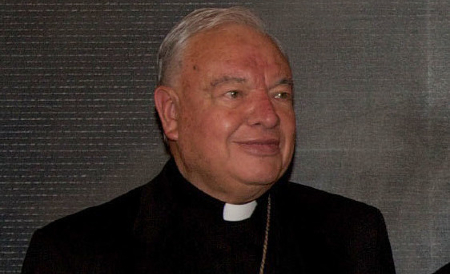
Cardinal Juan Sandoval Iniguez - Synod Does Not Have Doctrinal Authority
FREE Catholic Classes
Cardinal Juan Sandoval Iniguez, the archbishop emeritus of Guadalajara, Mexico, and one of the five signatories of the recent dubia sent to Pope Francis, sheds light on the nature of synods and their doctrinal authority. In a candid interview, the 90-year-old cardinal emphasized that "a synod does not have doctrinal authority," raising concerns about the potential implications of granting it such authority.

Cardinal Juan Sandoval Iniguez
Highlights
10/12/2023 (2 years ago)
Published in Living Faith
Keywords: Cardinal Juan Sandoval Iniguez, Dubia, Catholic Church, Synod on Synodality, Doctrinal Concerns, Pope Francis, Catholic Doctrine
The term "dubia" refers to questions seeking clarification, and the cardinal clarified that true doctrinal authority resides in the pope or the worldwide episcopate, collectively with the pope. Synods, he emphasized, possess only pastoral competencies and are tasked with the best application of the Gospel to the faithful in pastoral care, lacking doctrinal authority.
Cardinal Sandoval, alongside Cardinals Robert Sarah, Joseph Zen Ze-kiun, Raymond Leo Burke, and Walter BrandmĂÂĽller, signed the dubia on July 10, and then again on August 23. These dubia addressed a range of concerns, including the reinterpretation of divine revelation, blessings for homosexual partners, and the concept of synodality as a "constitutive dimension of the Church." They also inquired about the possibility of priestly ordination for women and whether repentance is necessary for sacramental absolution in confession.
The questions were originally sent to Pope Francis on July 10, with responses received the following day. Unhappy with the answers, the cardinals restated their questions on August 23, and as of October 2, these queries remain unanswered. Frustrated with the lack of response, the cardinals made their questions public just two days before the Synod on Synodality commenced.
In the interview, Cardinal Sandoval explained the motivations behind signing the dubia. He cited imprecise expressions in the synod discussions that could lead to erroneous interpretations of critical issues. The cardinals' aim was to safeguard the truth and provide clear guidance for those participating in the synod with goodwill. He noted that Pope Francis's initial responses to the dubia were perceived as evasive and vague, leading to a rephrasing of the questions for greater clarity and force. This move was aimed at eliciting direct yes-or-no answers from the Holy Father.
Addressing concerns about doctrinal debates within the Church, Cardinal Sandoval emphasized that such discussions have always existed and will continue as long as the Church endures. He urged Catholics to adhere to the simplicity of Gospel truth, based on Scripture and the Church's longstanding teachings, to avoid confusion.
Cardinal Sandoval expressed concern that the Synod on Synodality might deviate from doctrine, which he finds deeply troubling. He acknowledged that throughout history, the Church has encountered situations where meetings, synods, and councils had doctrinal discrepancies. He stressed the importance of adhering to essential truths of faith, even when accommodating modern trends and personal preferences, as such compromises can distort the truth.
In response to criticisms from other cardinals, particularly Cardinal VĂÂctor Manuel FernĂ¡ndez, Cardinal Sandoval defended the dubia signatories' intentions, emphasizing that they sought clarification for the sake of the Church and the truth. He reiterated that cardinals, as advisors to the pope, collaborate in dialogue to address crucial matters of faith and morals, ensuring the Church's well-being.
Cardinal Juan Sandoval Iniguez was born on March 28, 1933, in Yahualica, Mexico. He was ordained a priest in 1957 and later obtained a doctorate in theology from the Pontifical Gregorian University in Rome. His ecclesiastical journey led to his appointment as coadjutor bishop of the Diocese of Ciudad JuĂ¡rez in 1988, and he became its bishop in 1992. In 1994, he was appointed archbishop of Guadalajara, a position he held for 17 years until his resignation in 2011 due to the age limit. He now resides in Guadalajara.
Join the Movement
When you sign up below, you don't just join an email list - you're joining an entire movement for Free world class Catholic education.
Our Important Lenten Message - Please Watch
- Easter / Lent
- 5 Lenten Prayers
- Ash Wednesday
- 7 Morning Prayers
- Mysteries of the Rosary
- Litany of the Bl. Virgin Mary
- Popular Saints
- Popular Prayers
- Female Saints
- Saint Feast Days by Month
- Stations of the Cross
- St. Francis of Assisi
- St. Michael the Archangel
- The Apostles' Creed
- Unfailing Prayer to St. Anthony
- Pray the Rosary
![]()
Copyright 2026 Catholic Online. All materials contained on this site, whether written, audible or visual are the exclusive property of Catholic Online and are protected under U.S. and International copyright laws, © Copyright 2026 Catholic Online. Any unauthorized use, without prior written consent of Catholic Online is strictly forbidden and prohibited.
Catholic Online is a Project of Your Catholic Voice Foundation, a Not-for-Profit Corporation. Your Catholic Voice Foundation has been granted a recognition of tax exemption under Section 501(c)(3) of the Internal Revenue Code. Federal Tax Identification Number: 81-0596847. Your gift is tax-deductible as allowed by law.






